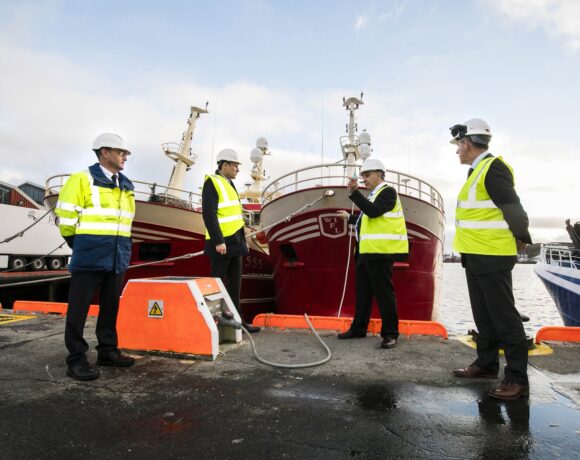Met Éireann is releasing the first climate projections of the TRANSLATE initiative at the European Climate Change Adaptation Conference 2023 (ECCA).
TRANSLATE brings together all previous climate projections of relevance for Ireland, enhancing and improving their confidence and robustness and it combines them into one, easy to use, national resource to help Irish society to speak the same climate language. This novel initiative not only examines a range of potential future green-house emission scenarios, but also for the first time it allows decision-makers to see what Ireland would look like in different warmer-world scenarios. This will benefit all sectors of Irish society, including the energy sector.
Initial findings from TRANSLATE climate projections confirm a warming climate signal for Ireland. Temperatures are projected to increase across all greenhouse gas emission scenarios. The TRANSLATE dataset confirms that Ireland is likely to experience a decrease in the frequency of cold winter nights and up to a 10-fold increase in the frequency of warm (> 15°C) summer nights, alongside an increasing number of heatwaves, by the end of the century. In terms of precipitation, summers are projected to be drier and winters to be wetter, with precipitation increasing annually overall.
TRANSLATE’s first results are released as the World Meteorological Organisation (WMO) launches the State of the Climate in Europe 2022 report in Dublin. WMO highlights the key role of climate services for decision-makers and for supporting the achievement of net-zero commitments. In this sense, TRANSLATE is a stepping-stone in the development of Ireland’s National Framework for Climate Services (NFCS). Coordinated by Met Éireann’s and partner organisations, the NFCS supports climate adaptation by providing tailored information and services on Ireland’s changing climate to the public and key stakeholders, such as the energy sector.
TRANSLATE climate projections will be freely accessible to the public and decision makers around the country. Climate information from TRANSLATE will be easily accessible and useable and in line with Met Éireann’s objective to enhance the understandability of complex future climate scenarios by all stakeholders. This will support the many communities and users affected by the impacts of climate change ranging from school teachers to engineers and from sectoral planners to policy makers.
Commenting on the launch, Keith Lambkin, Head of Climate Services at Met Éireann stated, “working closely with our partners, we are delighted to release the first projections from the TRANSLATE initiative. This is a critical step forward in the provision of robust climate services in Ireland. Easily accessible and understandable climate information is vital to support decisions which address key climate issues and risks that impact the public and all sectors of society including the energy sector.”
“The insights gained to date really demonstrate the value of the TRANSLATE approach. This collaborative initiative is already playing a key role in informing Government and sectoral climate planners. TRANSLATE outputs are being used to help improve climate resilience, for example in our built environment ensuring future buildings and critical infrastructure can handle more extreme heat conditions and that road drainage can manage changes in rainfall patterns. One common standardised set of national climate projections ensures we are all singing from the same climate hymn sheet.”
While the initial results are announced, TRANSLATE’s work is far from being over. Met Éireann is funding TRANSLATE-2, a follow-on project which will build upon the current results and continue developing Ireland-tailored climate products and services.
Dr Paul Nolan, project lead and Climate Science Programme Manager at the Irish Centre for High-End Computing, University of Galway commented, “to build on these significant advances and to stay abreast of international best practice, the follow-on TRANSLATE project will update the climate projections with post-processed model simulations based on the latest high-resolution data and emission scenarios. We will also extend the product range to include more variables, such as wind, humidity, and radiation. The improved outputs will support a wide range of sectors in taking well-informed climate adaptation, mitigation, and planning decisions.”
Dr Páraic Ryan, UCC project lead and Senior Lecturer at University College Cork commented, “the next phase of TRANSLATE will continue providing risk-based decision support tools and illustrative climate risk case-studies to facilitate more robust adaptation decisions, considering the variability and uncertainty associated with future climate, infrastructure performance and societal dynamics.”
The TRANSLATE research initiative is a collaborative effort led by climate researchers from University of Galway – Irish Centre for High-End Computing (ICHEC) and University College Cork – SFI Research Centre for Energy, Climate and Marine (MaREI), supported by Met Éireann climatologists.













